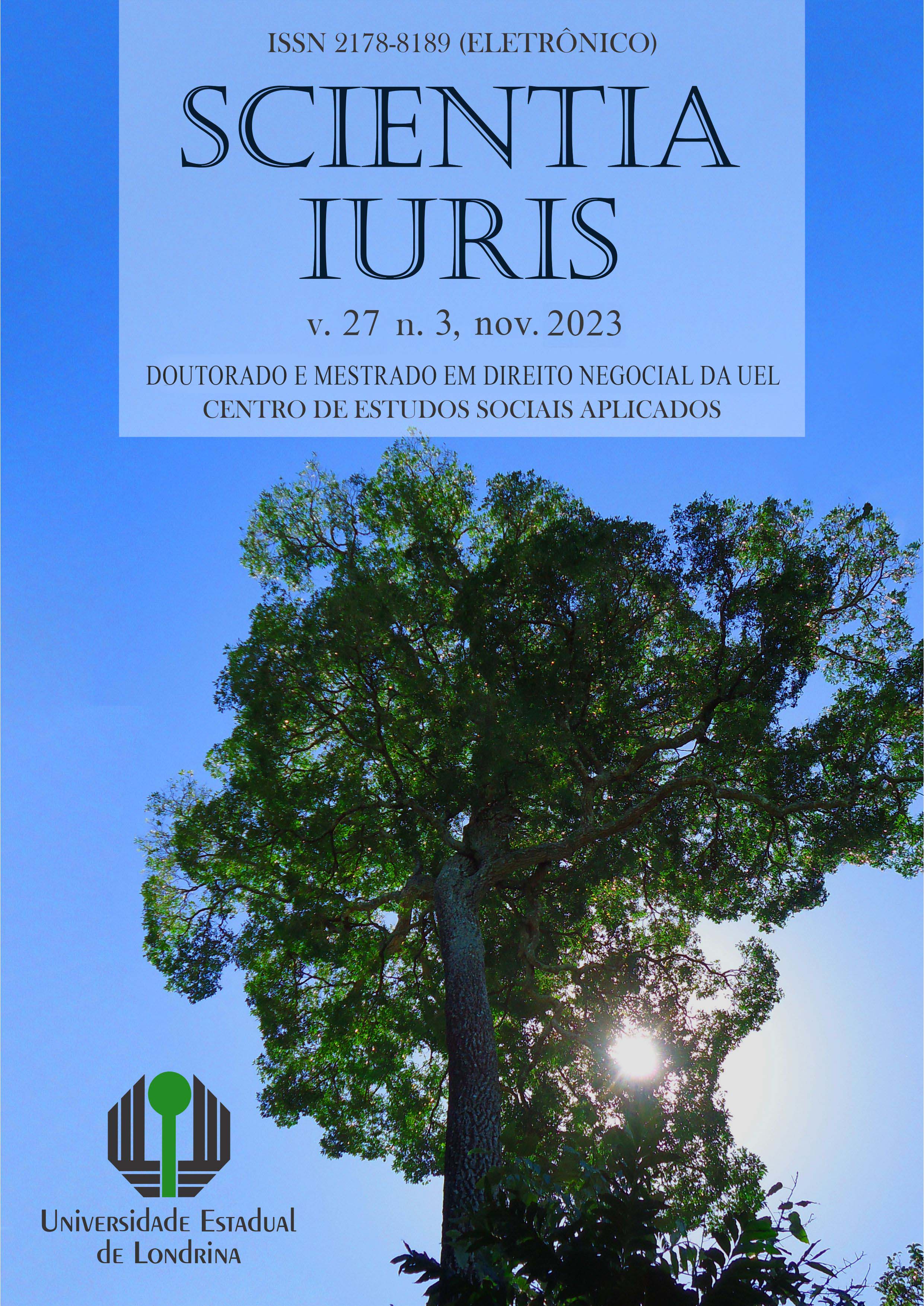Judiciary crisis and public will as a way of litigation prevention
DOI:
https://doi.org/10.5433/2178-8189.2023v27n3p155-170Keywords:
judiciary crisis; dejudicialization; succession planning; notary services; testament.Abstract
The crisis of the Judiciary impacts the lives of citizens, restricting access to justice and guaranteeing fundamental rights. In this research, dejudicialization stands out as a phenomenon capable of minimizing the damage suffered in this area. For this, it was proposed to study the public will, made in extrajudicial services, as a way to prevent disputes when the testator succeeds. A mitigation measure for the judiciary crisis is proposed. The research problem is: can the public will be used as a form of succession planning and litigation prevention? It aims to demonstrate that the public will is an effective tool for succession planning and litigation prevention. The deductive method was adopted. The theoretical framework of access to justice is based on Cappelletti and Garth. The study addresses the crisis of the Judiciary regarding access to justice through alternative means; succession planning and its implications; the public will as a form of succession planning and a strategy of dejudicialization. It is concluded that, with the making of the will, the probability of the will of the testator being followed, without disputes, is much greater than in the absence of the will, and the inventory and sharing can be extrajudicial, before the notary offices. There is a tendency to adopt extrajudicial means.
Downloads
References
ALMEIDA, Selene Maria de. O paradigma processual do liberalismo e o acesso à justiça. Revista CEJ, v. 7, n. 22, p. 20-24, 2 set. 2003. Disponível em: https://revistacej.cjf.jus.br/cej/index.php/revcej/article/view/559. Acesso em: 10 abr. 2023.
ASSOCIAÇÃO de Notários e Registradores do Brasil - ANOREG/BR. Cartório em Números - 2022. 4. ed. 2023. Disponível em: https://www.anoreg.org.br/site/wp-content/uploads/2022/12/Carto%CC%81rios-em-Nu%CC%81meros-Edic%CC%A7a%CC%83o-2022.pdf. Acesso em: 10 abr. 2023.
BRASIL. Conselho Nacional de Justiça. Justiça em Números 2022. Brasília: CNJ, 2022. Disponível em: https://www.cnj.jus.br/wp-content/uploads/2022/09/justica-em-numeros-2022.pdf. Acesso em: 20 out. 2022.
BRASIL. Casa Civil. Constituição Federal de 1988. Diário Oficial República Federativa do Brasil, Brasília, DF, 5 out. 1988. Disponível em: http://www.planalto.gov.br/ccivil_03/constituicao/constituicao.htm. Acesso em: 10 set. 2022.
CAPPELLETTI, Mauro; GARTH, Bryant. Acesso à justiça. Trad. Ellen Gracie Northfleet. Porto Alegre: Sergio Fabris Editor, 1988.
CARVALHO, Dimas Messias de. Direito das sucessões: inventário e partilha. 5.ed. São Paulo: Saraiva Educação, 2018.
DINAMARCO, Cândido Rangel. A instrumentalidade do processo. 4. ed. São Paulo: Malheiros, 1994.
FERREIRA, Paulo Roberto Gaiger; RODRIGUES, Felipe Leonardo. In: CASSETTARI, Christiano. Tabelionato de notas II: atos notariais em espécie. São Paulo: Saraiva, 2016.
GONÇALVES, Carlos Roberto. Direito Civil Brasileiro: Direito das Sucessões. 15. ed. São Paulo: Saraiva, 2021. Vol. 7.
GONÇALVES, Carlos Roberto. Direito Civil Brasileiro: Direito das Sucessões. 11. ed. São Paulo: Saraiva, 2017. Vol. 7.
GAGLIANO, P. S.; PAMPLONA Filho, Rodolfo. Novo Curso de Direito Civil. 3.ed. São Paulo: Saraiva, 2016.
GORETTI, Ricardo. Mediação e Acesso à Justiça. 2. ed. Editora Juspodivm: Salvador, 2021.
HENRIQUES, Antonio; MEDEIROS, João Bosco. Monografia no Curso de Direito: trabalho de conclusão de curso. 3.ed. São Paulo: Atlas, 2003.
HILL, Flávia Pereira. Desjudicialização e acesso à justiça além dos tribunais: pela concepção de um devido processo legal extrajudicial. Revista Eletrônica de Direito Processual - REDP, Rio de Janeiro, ano 15, vol. 22, n. 1, jan. a abr., 2021. Disponível em: https://www.e-publicacoes.uerj.br/index.php/redp/article/view/56701/36324. Acesso em: 10 abr. 2023.
HIRONAKA, Giselda Maria Fernandes Novaes; TARTUCE, Flávio. Planejamento Sucessório: conceito, mecanismos e limitações. Revista Brasileira de Direito Civil - RBDCivil, Belo Horizonte, v. 21, p. 87-109, jul./set. 2019a. Disponível em https://rbdcivil.ibdcivil.org.br/rbdc/article/view/466/309. Acesso em: 10 nov. 2022.
HIRONAKA, Giselda Maria Fernandes Novaes; TARTUCE, Flávio. Planejamento sucessório: conceito, mecanismos e limitações. In: TEIXEIRA, Daniele Chaves (Coord.). Arquitetura do planejamento sucessório. 2. ed. Belo Horizonte: Fórum, 2019b, p. 433-450. Tomo I.
PENA JR., Moacir César. Curso completo de direito das sucessões. Doutrina e jurisprudência. São Paulo: Método, 2009.
PINHO, Humberto Dalla Bernardina de. A releitura do princípio do acesso à justiça e o necessário redimensionamento da intervenção judicial na resolução de conflitos na contemporaneidade. Revista EMERJ, Rio de Janeiro, v. 21, n. 3, t. 1, p. 241-271, set.-dez., 2019. Disponível em: https://www.emerj.tjrj.jus.br/revistaemerj_online/edicoes/revista_v21_n3/tomo1/revista_v21_n3_tomo1_241.pdf. Acesso em: 10 abr. 2023.
RODRIGUES, A. O. et al. IRPJ e CSLL: Manual do Imposto de Renda Pessoa Jurídica e Contribuição Social sobre Lucro Líquido. 3. ed. São Paulo: IOB, 2009.
SERPA, Maria de Nazareth. Mediação: uma solução judiciosa para os conflitos. Belo Horizonte: Del Rey, 2018.
TARTUCE, Flávio. Manual de Direito Civil. 9. ed. Rio de Janeiro: Forense | São Paulo: Método, 2019. Volume único.
Downloads
Published
How to Cite
Issue
Section
License
Copyright (c) 2023 Rosana Ferreira Trevizan , Ricardo Goretti

This work is licensed under a Creative Commons Attribution 4.0 International License.
The journal reserves the right to modify, in the original text of the submitted article, normative, spelling and grammatical mistakes in order to maintain the cultured standard of language and the credibility of the journal. The journal will respect the authors' writing style. Changes, corrections or suggestions of conceptual order will be sent to the authors, when necessary. In such cases, the articles will be re-examined. The final exams will not be sent to the authors. The published works become the property of the journal, in other words, its total or partial reprinting is subject to the express authorization of the journal. In all subsequent citations, the original source of publication shall be cited and in the case of Photographic Speeches, shall be approved by the original author. The opinions expressed by the authors of the journal's articles are of their sole responsibility.


















